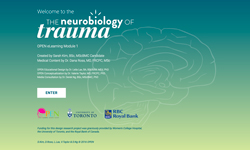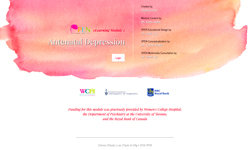Module 1 – The Neurobiology of Trauma

Post-traumatic Stress Disorder (PTSD) is a common diagnosis following a traumatic event. Trauma seizes the brain and compromises emotional, cognitive, and bodily functions, often making it debilitating for patients. PTSD is believed to reflect real stress-induced changes in neurobiological systems, yet it is not well understood; few community resources are available despite its high prevalence.
It is possible that you as a family physician may be the first line of contact with a patient with PTSD. Learning the often subtle and different expressions of PTSD may help you detect patients at risk of trauma and provide the best care. This module will serve as an introduction to key concepts in PTSD and will follow the narrative of one patient, Ms. A, over three office visits.
Module 2 – Antenatal Depression

Approximately 10-15% of women experience major depression during pregnancy, known as antenatal depression. Antenatal depression affects the wellbeing of the woman, her infant and can impact the family system as a whole. Depressive episodes can be a reaction to the pregnancy itself, to associated health issues or to other major life stressors. They can also be a continuation of a depressive disorder or relapse of a pre-pregnancy condition, especially among women who stop taking medication on confirmation of pregnancy.
In your practice, at some point you will encounter women who are at risk for or already experiencing antenatal depression. To ensure you provide the best care possible, it is essential to understand key facts about this treatable, yet often undetected, disorder. This module is designed to help Family Physicians expand their understanding of depression during pregnancy.
Module 3 – Anorexia Nervosa

In order for clinicians to adequately treat patients with eating disorders, it is essential that they understand the presentation, the neurological correlates of these symptoms, and the linkages with depression. It is also essential for practitioners to understand the potential positive outcomes for patients, so that they can work to foster a return to wellness.
The purpose of this OPEN eLearning module is to help family physicians understand the linkages between depression in anorexia nervosa and the necessity of eating for wellness.
Module 4 – Obesity and Mental Health
Content coming soon.